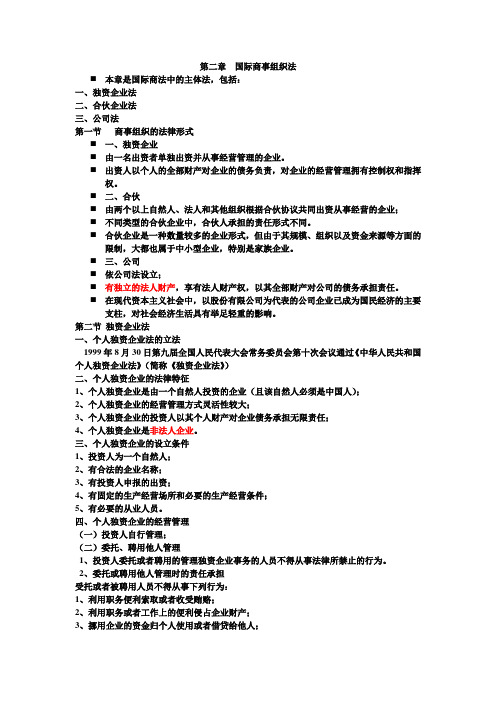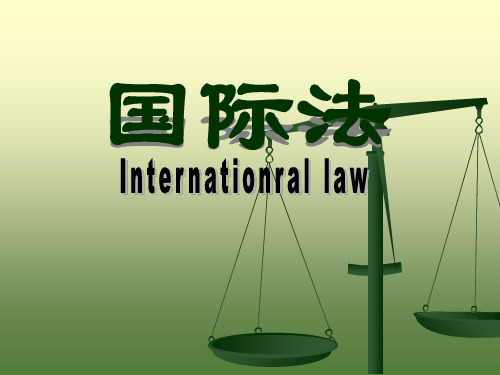国际商法课件
国际商法课件

第二章国际商事组织法⏹本章是国际商法中的主体法,包括:一、独资企业法二、合伙企业法三、公司法第一节商事组织的法律形式⏹一、独资企业⏹由一名出资者单独出资并从事经营管理的企业。
⏹出资人以个人的全部财产对企业的债务负责,对企业的经营管理拥有控制权和指挥权。
⏹二、合伙⏹由两个以上自然人、法人和其他组织根据合伙协议共同出资从事经营的企业;⏹不同类型的合伙企业中,合伙人承担的责任形式不同。
⏹合伙企业是一种数量较多的企业形式,但由于其规模、组织以及资金来源等方面的限制,大都也属于中小型企业,特别是家族企业。
⏹三、公司⏹依公司法设立;⏹有独立的法人财产,享有法人财产权,以其全部财产对公司的债务承担责任。
⏹在现代资本主义社会中,以股份有限公司为代表的公司企业已成为国民经济的主要支柱,对社会经济生活具有举足轻重的影响。
第二节独资企业法一、个人独资企业法的立法1999年8月30日第九届全国人民代表大会常务委员会第十次会议通过《中华人民共和国个人独资企业法》(简称《独资企业法》)二、个人独资企业的法律特征1、个人独资企业是由一个自然人投资的企业(且该自然人必须是中国人);2、个人独资企业的经营管理方式灵活性较大;3、个人独资企业的投资人以其个人财产对企业债务承担无限责任;4、个人独资企业是非法人企业。
三、个人独资企业的设立条件1、投资人为一个自然人;2、有合法的企业名称;3、有投资人申报的出资;4、有固定的生产经营场所和必要的生产经营条件;5、有必要的从业人员。
四、个人独资企业的经营管理(一)投资人自行管理;(二)委托、聘用他人管理1、投资人委托或者聘用的管理独资企业事务的人员不得从事法律所禁止的行为。
2、委托或聘用他人管理时的责任承担受托或者被聘用人员不得从事下列行为:1、利用职务便利索取或者收受贿赂;2、利用职务或者工作上的便利侵占企业财产;3、挪用企业的资金归个人使用或者借贷给他人;4、擅自将企业资金以个人名义或者以他人名义开立账户储存;5、擅自以企业财产提供担保;6、未经投资人同意,从事与本企业相竞争的义务;7、未经投资人同意,同本企业订立合同或者进行交易;8、未经投资人同意,擅自将企业商标或者其他知识产权转让给他人使用;9、泄露本企业的商业秘密;10、法律、行政法规禁止的其他行为。
第5章 买卖法 《国际商法》PPT课件

2)英美法系
(3)《公约》
买方的义务通常与卖方的权利相对应。 根据各国法律和《公约》的规定,如果 当事人没有特别的约定,买方主要应承 担两项义务:一是支付货款;二是收取 货物。 《德国民法典》规定,买方对卖方负有 支付约定价金及受领买卖物的义务。 如果双方在订约时没有规定具体的价金 而是依市价确定,则应以履行时履行地 的市价为准。 《法国民法典》也认为支付价金是买方 的主要义务,但是如果合同没有规定支 付时间和地点,法国法采取与德国法不 同的做法,认为应在交付标的物的地点 和时间支付价金。同时,如果买方不支 付价金,卖方可请求解除合同。
要求卖方交付替代货物。
要求对货物的不符之处进行修补。
购买替代货物。
卖方应对不履行义务做出补救。
要求减价。
拒绝收取货物。
5.3 违约的救济
5.3.4 买方违约时卖方的救济方法
一般来说,买方违约的表现为不按照合同约定支付货款或接收货物。对于买方违约时 卖方的救济方法,《公约》认为卖方除了可以行使要求买方实际履行、卖方中止履行 合同义务、给买方迟延履行宽限期、宣告合同无效以及在行使上述任何救济的同时单 独要求损害赔偿的权利救济外,还可以有针对性地选择以下救济手段维护自身的权益:
(1)转卖货物 (2)自行确定货物的具体规格 (3)要求支付利息
5.3 违约的救济
5.3.5 《商事通则》的规定 正如我们前面所介绍的,《商事通则》是作为一般法原则出现在国际贸易统 一法的历史舞台上的。它不具有强制性,不要求各个国家都接受。它以其独 立的形式存在并完整而系统地表达对合同行为的法的规范。 《商事通则》是对《公约》的解释和补充,它对合同行为的履行、不履行及 对不履行的救济的一般性规定均适用于国际货物买卖合同遭到违反时买卖双 方可能采取的各种权利救济措施,因此,我们有必要对其进行了解。
国际商法 全套 PPT课件

甚至还存在个别的衡平法院。
11
3、制定法 英美法系也有制定法。英王很早便发布过一些具有实体法或
程序法内容的敕令。最近两个世纪,特别是20世纪以后,议会更 通过大批立法,在某些领域,如刑事案件的审判,其主要依据已 是制定法,而不是判例。但英国的制定法有其特点,即不论民事、 刑事的实体法和程序法,都没有统一的法典;对某些特定问题例 如证据、货物销售、性犯罪、盗窃罪以及青少年犯罪等,虽然制 定了单行法,但是往往民刑不分、实体规定与程序规定兼及,而 且修改频繁,同名法令很多,在援用时必须注明法令颁布的年代, 有的法令内容重复,甚至前后规定不一;而且,法令绝大部分是 归纳判例而成,不论概念或原则,类多来自司法习惯,因而解释 和适用时往往需要借助判例。 代表国家:英国、美国
14
二、中国的司法制度 1、中国的法律体系 最高法院、地方高级法院、地方中级法院、基
层法院、专门法院 管辖(地域管辖、级别管辖、专门管辖)
15
2、民商事审判制度 两审终审 合议制 诉讼基本程序【立案、送达、开庭、判决、执
行】
16
三、中国的民商法 1、民法通则 侵权责任法、合同法、物权法 2、商法
9
二、英美法系【普通法系】 1、普通法 1066年诺曼底公爵威廉征服英国以前,英国各地 施行的是盎格鲁-撒克逊的习惯法;东北部则施行入侵 的丹麦人传入的北欧条顿人习惯法。诺曼人在英国建 立以国王为中心的封建土地制度,逐步形成王权专制 国家,在历史上第一次设立权威极大的御前会议,以 其判例作为普通法适用于全国,并由国王派出的巡回 法官在各地宣传和施行这些法律。狭义的普通法即指 这类判例法。
17
第二章 商事组织法
重点内容: 1、合伙企业的类型和特点 2、公司的类型及运作
国际商法课件

2020/12/13
国际法
15
大陆法系各国的法院组织
大陆法各国的法院组织虽然各有特点,但都 有一些共同之处.主要表现在: 法院的层次基本相同;各国除普通法院以外, 都有一些专门法院与普通法院同时并存. 各国法院基本上都分为三级,即第一审法院、 上诉法院和最高法院.
2020/12/13
国际法
16
普通法系的概念和特征
2020/12/13
国际法
24
2.反共,也可以说是冷战意识
在美国,反共产党、反共产主义和社会主 义,是不需要任何理由的,反本身就是理 由。马克思主义归根到底就是一句话:反 对资本奴役劳动,最终要消灭资本,解放 劳动,未来要让劳动者自由联合,自己为 自己劳动。所以,共产党传承马克思,美 国则是最崇拜资本、最强大的资本主义国 家,谁有资本、谁的资本大,谁就有权利, 谁可以说了算,没有资本就没有发言权。
2020/12/13
国际法
19
"先例约束力的原则"
1)上议院的判决是具有约束力的先例,对全国各级审判机关 都有约束力, 一切审判机关都必须遵循,但上议院可不受其先例的约束. (2)上诉法院的判决可构成对下级法院有约束力的先例,而 且对上诉法院本
身也有约束力. (3)高级法院的每一个庭的判决对一切低级法院有约束力, 对高等法院的其
2020/12/13
国际法
7
国际条约的种类
条约又分双边条约和多边条பைடு நூலகம்(又称公约)
2020/12/13
国际法
8
(二)国际惯例
国际惯例,是指国际经济法主体重复类似的行为而上升为 对其具有拘束力的规范. 法律上的惯例与习惯是有本质的不同的,前者一旦被当事 人加以采用,便对该当事人具有法律拘束力,后者只是一种 习惯的行为.从这个意义上说,虽然国际惯例没有普遍的约 束力,无法与国际公约的效力相比,但在某些具体的当事人 之间却有像国际公约一样的强制力.有些国际惯例已经被 某些国家纳入其国内的成文法,从而具有了法律的普遍约 束力.还有些国家的国内法规定,国际惯例的适用无须当事 人明示表示同意.由此可见,目前国际惯例与国际公约在强 制力上的这种区别已经被渐渐淡化了,采用国际惯例已经 成为国际上的一种趋势.我国对国际商事活动中的国际惯 例,历来给予高度的重视,并严格予以遵守.
国际商法课程ppt课件

资 金 是 运 动 的价值 ,资金 的价值 是随时 间变化 而变化 的,是 时间的 函数, 随时间 的推移 而增值 ,其增 值的这 部分资 金就是 原有资 金的时 间价值
1.国 际 条 约
◆ 关于知识产权的国际条约: 1883年《巴黎公约》 1891年《马德里协定》
(三)普通法系(Common Law System ) 也称作英美法系、判例法系
起源:中世纪英国的习惯法 2. 代表国家:英国、美国(P6) 3. 渊源:判例——先例约束力原则 4. 特点:英国——普通法和衡平法
美国——此外,联邦法和州法
•ቤተ መጻሕፍቲ ባይዱ
资 金 是 运 动 的价值 ,资金 的价值 是随时 间变化 而变化 的,是 时间的 函数, 随时间 的推移 而增值 ,其增 值的这 部分资 金就是 原有资 金的时 间价值
案例
中国贪官为何总逃往加拿大 新入伙人对入伙之前的债务是否负责?
中国:连带责任;英国:不负责任 中国外贸代理制、货代、船代 FOB CFR CIF
要约(发盘) 承诺(接受)
资 金 是 运 动 的价值 ,资金 的价值 是随时 间变化 而变化 的,是 时间的 函数, 随时间 的推移 而增值 ,其增 值的这 部分资 金就是 原有资 金的时 间价值
1.国 际 条 约
各国缔结的有关国际商业和贸易的国际条约或公约。 重要渊源
资 金 是 运 动 的价值 ,资金 的价值 是随时 间变化 而变化 的,是 时间的 函数, 随时间 的推移 而增值 ,其增 值的这 部分资 金就是 原有资 金的时 间价值
1.国 际 条 约
有关国际商法的国际公约: ◆ 调整国际货物买卖关系的条约: 1974年《国际货物买卖时效期限条约》 1980年《联合国国际货物销售合同公约》
第1章 国际商法概述 《国际商法》PPT课件

在现代大陆法系国家的商法中, 最具有代表性、影响力最大的是 法国和德国的商事法。1807年的 《法国商法典》和1900年的《德 国商法典》曾是许多大陆法系国 家仿效的对象,大陆法系亦是以 此为基础建立起来的。
• (1)法国商事法。 • (2)德国商事法。
1.3 西方两大商法体系
1.3.3 英美法系中的商法体系
英美法系国家以英国和美国为代表,尽管两国在法律渊源等方面有许多近似之处,但在自身
的发展过程中也形成了各自独特的体系,商法体系也不例外。
1)英国商事法 英国是传统的判例法国家,没有像大陆法那种形式意义上的商法,但在英国存在实质上的商法。可以毫不夸张 地说,大陆法系现代商法中的各项基本制度在英国法中均有类同的法律概括,这不仅表现在有关公司法、票据 法、保险法、破产法等特别法中,而且表现在对商人资格、商业组织、商事合伙、商事代理等一系列的基本规 定和定义概括中。 英国的商人法像大陆法系一样,也起源于中世纪的商人习惯法。
1.2.1 国际条约
国际条约或公约是国际商法的最 主要渊源,是国际法主体之间以 国际法为准则,为确立其相互权 利、义务而缔结的书面协议。
1.2.3 国内商事法
国际商法的主体主要是各国的自然人和法 人,国家只有在特殊情况下才会成为国际 商法的主体,这个特点决定了各国的国内 商事法也是国际商事行为的法律依据。
1.3 西方两大商法体系
1.3.2 大陆法系中的商法体系
1)民商合一与民商分立
2)各国的商事法
在对待商法的态度上,大陆法系 国家有两种做法:有些大陆法系 国家把民法和商法分别编成独立 的法典,即民法典和商法典。
• (1)民商合一。 • (2)民商分立。 • (3)民法与商法的适用原则。 • (4)我国民法与商法的关系。
国际商法课件

• 4、两合公司
有限责任股东和无限责任股东组成的企业法人。
35
二、有限责任公司
• • • • • • • (一)我国之规定 1、股东50人以下,允许1人公司 2、股东责任的有限性 3、股东出资的非股份性 4、公司资本的封闭性 5、公司组织的简易性 6、资合与人合的统一
36
• • • • •
(二)一人公司 1、提高一人公司的注册资本 2、一人只能设立一个有限责任公司 3、登记注明是一人自然人还是一人法人 4、每年提交报告,并经会计师事务所审 计 • 5、有限责任的限制。如不能证明个人财 产与公司财产分离,则对公司债务承担 连带责任。 • (三)国有独资公司
15
五、美国的法院结构
• 联邦法院 • 州法院
• 返回
16
一、中国法律的渊源
• • • • • • • (一)制定法 1 宪法 2 法律 3 行政法规 4 地方性法规和经济特区法规 5 特别行政区的法律
17
• • • • • •
(二)法律解释 1 立法解释 2 司法解释 3 行政解释 (三)判例 在中国,判例在法律上和理论上不被认 为是法律的渊源。最高人民法院及其他 上级人民法院所作的判决对下级法院没 有拘束力。这一点与欧洲大陆法系国家 相似。 • 中国加入WTO以后,及时公布涉外经贸 案例已成为中国必须遵守的一项义务。
• • • • • • (一)国际(商务)条约 1、国际条约的概念 2、国际条约的效力 3、国际条约的种类: (二)国际惯例 国际惯例,是指国际经济法主体重复类似的行 为而上升为对其具有拘束力的规范。法律上的 惯例与习惯是有本质的不同的,前者一旦被当事 人加以采用,便对该当事人具有法律拘束力, 后者只是一种习惯的行为。 • (三)国内法
国际商法课件

3
1.国际商法是相关法律规范的总合 国际商法是相关法律规范的总合
法律规范即由国家制定或认可,依靠国家强制力保 法律规范 障实施的社会行为规范。 法律与道德规范的不同 (1)起源不同: 道德起源于原始社会 (2)表现形式不同: 道德存在于认的思维中 (3)具体内容不同: 法律体现权利与义务的 一致性,道德强调义务。 (4)实现方式不同: 道德依靠社会舆论 (5)调整的范围不同: 道德更为广泛,深刻
4
2.国际商法是调整跨越国界的商事关系的 国际商法是调整跨越国界的商事关系的 法律规范的总合
A. 国际意为“跨越国界”,国际商事关系是指处于不
同国家的商事主体之间发生的商事关系,而不是国家 和国家之间的商事关系,后者由国际公法调整。 B. 商事关系包括: (1)商事组织关系 (2)商事交易关系:传统商法仅调整有形商品的交易, 现代商法除调整有形商品的交易外,还调整无形商品 的交易,如国际技术转让、国际投资、国际融资等。
5
二、国际商法的历史发展
[国际商法历史发展简图 国际商法历史发展简图] 国际商法历史发展简图 古罗马时期出现了商法规范 (萌芽) ┇ 11世纪威尼斯商人习惯法(成为独立的法律部门) ┇ 16世纪成为国内法一部分 (丧失了国际性) ┇ 二战后统一的国际商法形成(蓬勃发展)
6
三、国际商法的渊源
1、国际条约 2、国际惯例 3、国内立法 4、国内判例
9
3、国内立法 、
* 世界主要国家的商事立法: 法国---1673年<商事条例>--路商 1681年<海事条例>--海商 1807年<法国商法典> 共4编,648条 [性质] 商行为法,即实施商行为者不论是不是商人,都适 用商法 [内容] 1.通则 2.海商 3.破产 4.商业裁判权
国际商法概述PPT课件

公法奉行“国家或政府干预”的理念,私法遵循“意思自 治”、“私法自治”的原则。
公法以政治国家为作用空间,私法以市民社会为功能范域。
.
22
商法的基本原则principal
1.维护市场正常运行原则 2.提高商事交易效益原则 3.保障商事交易安全原则
.
11
商法与经济法economic law的共性
都是规范经济活动的法律 经济法是公法,商法也带有某些 公法性质
.
12
商法和经济法的不同点
(1)所追求的利益不同
商法——着眼于商事主体的权益,侧重保护商事主体个体
经济法——着眼于整个国民经济生活的全局,侧重维护社会 整体利益
(2)调整范围不同
商法———调整商事主体间特有的经济关系
.
7
分类
从表现形式划分: 形式意义的商 法、实质意义的商法
从商法包括的内容划分: 广义商 法,狭义商法
从民法与商法关系划分: 民商合 一,民商分立
依立法基础划分: 商人商法,商行 为商法,折中商法,习惯商法
.
8
三、商法与其他法律的关系
商法与民法 商法与经济法 商法与行政法的关系 商法与劳动法的关系 商法与刑法 商法与国际法
.
2
第一章 国际商法概论
商法概述 国际商法概论 商事法律关系 两大法系
.
3
第一节 商法概述
商的概念 commercial
一般常识的商 经济学角度的商 商法的商(第一种商、第二种商、
第三种商、第四种商 ) 市场经济和商法
.
4
一、商法的商
第一种商:直接沟通商品生产者和消费者 第二种商:货运、仓储保管、居间、行纪、 代理 第三种商:银行、信托、加工承揽、制造、 出版印刷 第四种商:旅馆、饮食、广告、保险.18商法调整对象和范围调整对象
国际商法课件

❖ 《国际商事合同通则》第3.10规定:
对于因错误、欺诈、胁迫以及重大失衡而订立的合同, 受害一方当事人可以宣告合同无效。依有权宣告合同无效 一方当事人的请求,法庭可以变更该合同或其条款,以使 其符合公平交易的合理的商业标准。
国际商法课件
合同变更的效力
❖ 合同变更的实质在于使变更后的合同代替原合同。因此, 合同变更后,当事人应按变更后的合同内容履行。
❖ 合同变更原则上向将来发生效力,未变更的权利义务继 续有效,已经履行的债务不因合同的变更而失去合法性。
❖ 合同的变更不影响当事人要求赔偿的权利。原则上,提 出变更的一方当事人对对方当事人因合同变更所受损失 应负赔偿责任。
国际商法课件
合同变更要注意以下几个问题
❖ 变更合同必须当事人协商一致,任何当事人不能单方变更 合同,否则就构成违约。
国际商ห้องสมุดไป่ตู้课件
❖ 我国法律规定合同变更须具备以下条件:
1.原已存在有效的合同关系合同变更是在原合同的基础上,通过当 事人双方的协商或者法律的规定改变原合同关系的内容。 2.合同变更须依当事人双方的约定或者依法律的规定,并通过法院 的判决或仲裁机构的裁决发生合同变更,主要是当事人双方协商一 致的结果。 3.合同变更必须遵守法定的方式。我国《合同法》第77条第2款规 定:“法律、行政法规规定变更合同应当办理批准、登记等手续的, 依照其规定。” 4.须有合同内容的变化。合同变更仅指合同的内容发生变化,不包 括合同主体的变更。合同变更必须是非实质性内容的变更,变更后 的合同关系与原合同关系应当保持同一性。
❖ 中国法
我国《合同法》第79条规定:“债权人可以将合同的权利全部 或者部分转让给第三人”。
国际商法课件
国际商法完整ppt课件全套教学ppt教程

第三节 世界主要国家的法律体系与司法制度 11
•二、英美法系典型国家法律体系与司法制度 •(一)英国的法律体系和司法制度 •1.英国法的渊源 •⑴ 判例法 •⑵ 成文法 •⑶ 习惯法 •2.英国法的结构和特点 •⑴ 救济方法 •⑵ 诉讼程序 •⑶ 法院的组织系统 •3.英国的法院组织与司法制度
第三节 世界主要国家的法律体系与司法制度 12
•(二)美国的法律体系与司法制度 •1.美国法的渊源 •⑴ 判例法 •⑵ 成文法 •2.美国法的结构和特点 •3.美国的法院组织与司法制度 •美国的法院组织也反映出联邦制的特点,设有联邦和州的两 套法院体系。 •⑴ 联邦法院 •⑵ 州法院
第三节 世界主要国家的法律体系与司法制度 13
•三、大陆法系典型国家的法律体系与司法制度 •大陆法系一般是指以罗马法为基础而形成和发展起来的一个 完整的法律体系的总称。它主要是在罗马帝国的消亡过程中, 在欧洲大陆,尤其是在西欧国家中逐渐发展起来的法律制度。 因此,罗马法的概念和原则对大陆法的形成和发展产生了强 烈和直接的影响。 •(一)大陆法系的法律渊源和特点 •(二)大陆法系各国的法院组织
第五节 国际商事纠纷解决概述
16
•(一)和解 •和解是指在纠纷产生之后,双方当事人在自愿、互谅的基础 上,直接进行磋商,自行解决争议的活动。 •(二)调解 •调解是指国际商事交易纠纷的当事人在第三者的主持下,通 过调解、说服,促使双方当事人达成谅解协议,以解决争议 的活动。 •(三)仲裁 •仲裁也称公断,是指争议双方当事人依事先或事后达成的仲 裁协议,将他们之间的争议交付第三者居中评断,由第三者 作出裁决,该裁决对双方当事人均有约束力的纠纷解决方式。 •(四)诉讼 •当事人不愿进行和解或调解的,或者和解、调解不成,没有 在合同中订立仲裁条款,且事后又没有达成仲裁协议的,可 以向法院提起诉讼。
- 1、下载文档前请自行甄别文档内容的完整性,平台不提供额外的编辑、内容补充、找答案等附加服务。
- 2、"仅部分预览"的文档,不可在线预览部分如存在完整性等问题,可反馈申请退款(可完整预览的文档不适用该条件!)。
- 3、如文档侵犯您的权益,请联系客服反馈,我们会尽快为您处理(人工客服工作时间:9:00-18:30)。
一、 International law
1.the definition of international law: International law is the body of rules and norms that regulates activities carried on outside the legal boundaries of states. 2.the relationships regulated by international law: (1) those between states and states; (2)those between states and persons; (3)those between persons and persons
(二)International organizations 1.Intergovernmental organizations
(1)Intergovernmental organizations are permanent organizations set up by two or more states to carry on activities of common interest. (2)The United Nations is the most important international organizations, the organs of which are the General Assembly, the Security Council, the Secretariat, the International Court of Justice, the Trusteeship Council, and the Economic and Social Council. (3)Besides, WTO is the most important business organization in the world.
二、 The concept of international
business law
International business law is the body of rules and regulations that regulates business activities carried outside the legal boundaries of states. In particular, it deals with the business rights and obligations among individuals, enterprises, international organizations and states in their private position.
2.General principles defined in WTO Agreements. (四)Judicial decisions and the teachings of the most highly qualified publicists of the various nations, as subsidiary means for the determination of rules of law
2.To show that a customary practice has become customary law, two elements must be established—one behavioral and one psychological. (1)The behavioral is called usus (a consistent and recurring practice) ; (2)The psychological element in showing that a customary practice has become law is the requirement that states observing the custom must regard it as binding. This is often referred to by the Latin phrase “opinio juris sive necessitatis”, meaning the opinion that it is a necessary law
三、 Sources of international business
law
(一)International business treaties or conventions In international law the equivalents of legislation are treaties and conventions. 1.Treaties are legally binding agreements between two or more states; (1)bilateral treaties: formal binding agreements between two states (2)multilateral treaties: treaty between more than two states.
3.the department of international law: (1)Public international law which deals only with public conduct between states and was called the law of nations;
(2)International economic of economic activities internationally
(3)Private international law which is the name given to the rules that regulate the private affairs between civil subjects with equal status internationally. A. International business law B. Conflict law
2.Conventions are legally binding agreements between states sponsored by international organizations, such as the United Nations.
(二)International custom, as evidence of a general practice accepted as law 1. Custom is a long established tradition or usage that becomes customary law if it is consistently and regularly observed and recognized by those states observing it as a practice that they must obligatorily follow.
四、International business persons
The personalities of international business law are states, international organizations, businesses, individuals (一)States 1.States are political entities that have a territory , a population, a government capable of entering into international relations, and a government capable of controlling its territory and peoples.
3.Even if the international community follows a practice and recognizes it as binding customary law, under some circumstances the rule will not apply : (1)When a state persistently objects to a practice during its formative stages and thus never becomes a party to it; (2)When a state is allowed by the international community to deviate from the general practice.
(三)The general principles of law recognized by civilized nations General principles are the principles of law common to the world's legal systems 1. the Five Principles of Peaceful Coexistence : mutual respect for territorial integrity and sovereignty, mutual non-aggression, non-interference in each other's internal affairs, equality and mutual benefit, peaceful coexistence
